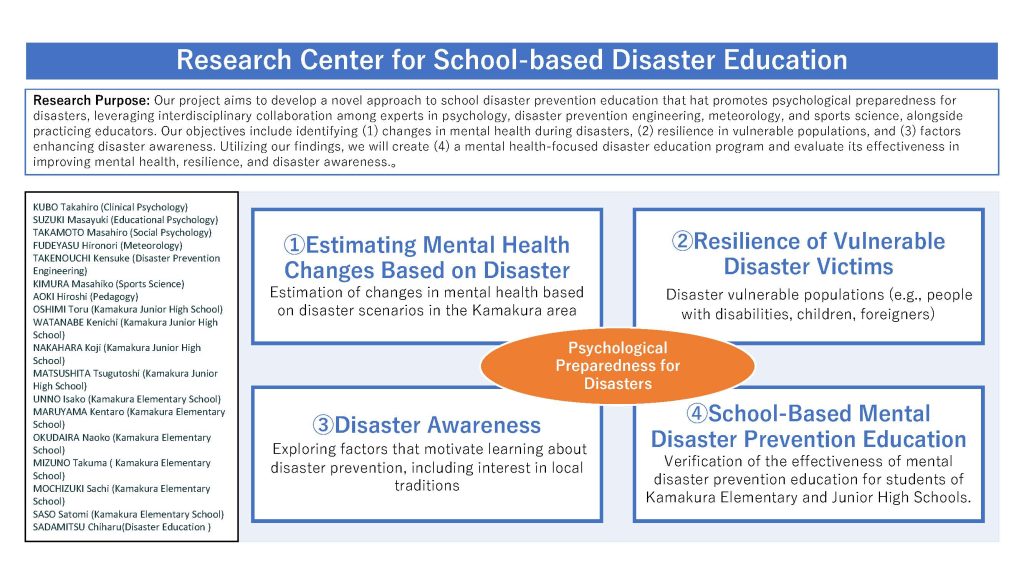Research Center for School-based Disaster Education
Research on Psychological Preparedness for Disasters Conducted in Schools
Research Purpose: The principal investigator, with extensive experience in counseling and researching the impact of disasters on children in Iwaki City, Fukushima Prefecture, has observed ongoing suffering among children and families. This observation underscores the necessity for psychological disaster mitigation alongside traditional disaster prevention measures to minimize both psychological and physical harm. Research indicates that disaster education should encompass not only awareness of disaster risks, emergency response training, and preparedness knowledge but also understanding and coping strategies for the psychological impacts and stress experienced by disaster victims (Motoyoshi, 2012). Furthermore, school-based disaster preparedness interventions are noted for their cost-effectiveness, as they reach a large audience simultaneously (Throuvala et al., 2019). Therefore, there is a pressing need to integrate mental health considerations into conventional disaster preparedness education within the school curriculum.
To address this need, our project aims to develop a novel approach to school disaster prevention education that hat promotes psychological preparedness for disasters, leveraging interdisciplinary collaboration among experts in psychology, disaster prevention engineering, meteorology, and sports science, alongside practicing educators. Our objectives include identifying (1) changes in mental health during disasters, (2) resilience in vulnerable populations, and (3) factors enhancing disaster awareness. Utilizing our findings, we will create (4) a mental health-focused disaster education program and evaluate its effectiveness in improving mental health, resilience, and disaster awareness.
Significance:
- Understanding mental health dynamics during disasters will facilitate timely and effective interventions, potentially preventing long-term issues such as PTSD and depression.
- Adopting a resilience perspective encourages not just immediate support for vulnerable groups but also their long-term recovery and development, enhancing the effectiveness of disaster education and response strategies.
- Enhancing disaster awareness aims to empower individuals and communities to proactively recognize disaster risks and implement preparedness and response actions accordingly.
To address this need, our project aims to develop a novel approach to school disaster prevention education that hat promotes psychological preparedness for disasters, leveraging interdisciplinary collaboration among experts in psychology, disaster prevention engineering, meteorology, and sports science, alongside practicing educators. Our objectives include identifying (1) changes in mental health during disasters, (2) resilience in vulnerable populations, and (3) factors enhancing disaster awareness. Utilizing our findings, we will create (4) a mental health-focused disaster education program and evaluate its effectiveness in improving mental health, resilience, and disaster awareness.
Significance:
- Understanding mental health dynamics during disasters will facilitate timely and effective interventions, potentially preventing long-term issues such as PTSD and depression.
- Adopting a resilience perspective encourages not just immediate support for vulnerable groups but also their long-term recovery and development, enhancing the effectiveness of disaster education and response strategies.
- Enhancing disaster awareness aims to empower individuals and communities to proactively recognize disaster risks and implement preparedness and response actions accordingly.

-
College of Education
-
College of Education
-
College of Education
-
College of Education
-
Kagawa UniversityKensuke TAKENOUCHI
-
Professor Emeritus at YNUMasahiko KIMURA
-
College of Education
-
Kamakura Junior High School Attached to YNUToru OSHIMI
-
Kamakura Junior High School Attached to YNUKenichi WATANABE
-
Kamakura Junior High School Attached to YNUKoji NAKAHARA
-
Kamakura Junior High School Attached to YNUTsugutoshi MATSUSHITA
-
Kamakura Elementtary School Attached to YNUIsako UNNO
-
Kamakura Elementtary School Attached to YNUKentaro MARUYAMA
-
Kamakura Elementtary School Attached to YNUNaoko OKUDAIRA
-
Kamakura Elementtary School Attached to YNUTakuma MIZUNO
-
Kamakura Elementtary School Attached to YNUSachi MOCHIZUKI
-
Kamakura Elementtary School Attached to YNUSatomi SASO
-
Institute for Multidisciplinary Sciences

